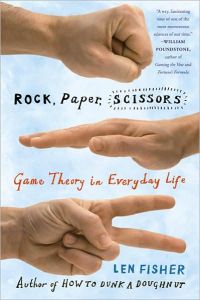Join getAbstract to access the summary!

Join getAbstract to access the summary!
Len Fisher
Rock, Paper, Scissors
Game Theory in Everyday Life
Basic Books, 2008
What's inside?
A lively introduction to game theory (or how to use the Prisoner’s Dilemma for fun and profit).
Recommendation
Len Fisher, an award-winning author of popular science books, has written an entertaining, enlightening and practical guide to the abstruse discipline of game theory. Fisher shows how game theory explains phenomena as mundane as why spoons go missing from a coffee break room, as ingenious as rabbinical problem solving in the Talmud and as fateful as global warming. getAbstract finds that his lively writing invites a wide audience. Fisher engages lay readers by elucidating an intensively mathematical subject without heavy reliance on equations or jargon. His treatment of the subject makes game theory appear only slightly more complicated than child’s play. In fact, he often uses children’s games to illustrate the role of game theory in daily life.
Summary
About the Author
Len Fisher, Ph.D., is the author of Weighing the Soul and How to Dunk a Doughnut, which was named Best Popular Science Book of the year by the American Institute of Physics. He is the recipient of an Ig Nobel Prize for calculating the optimal way to dunk a doughnut.

















Comment on this summary